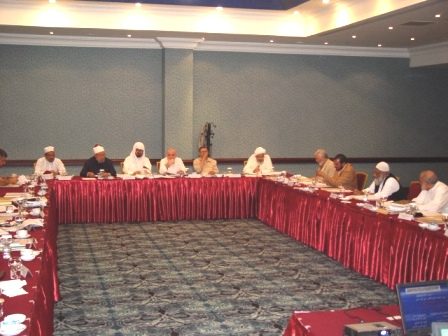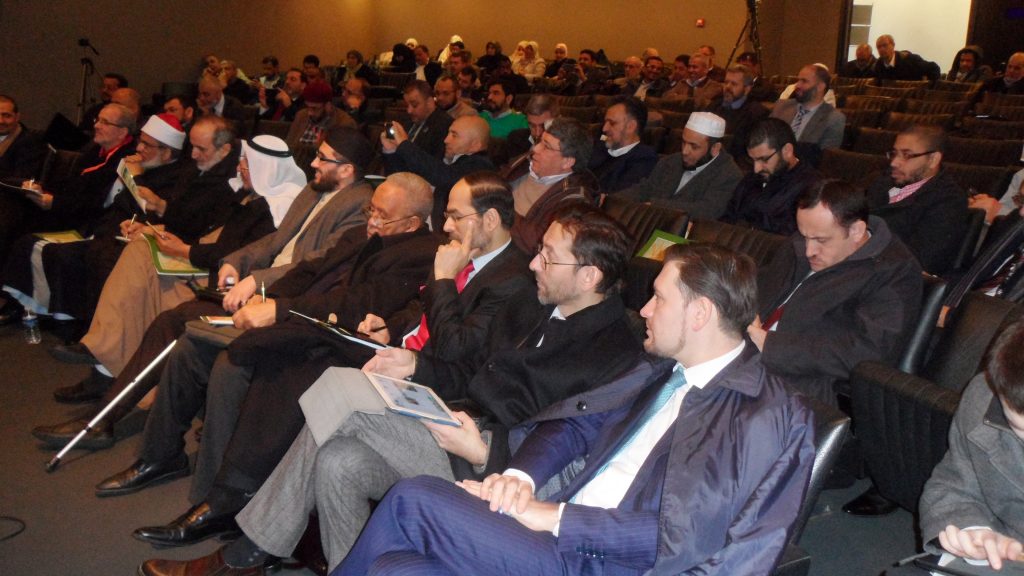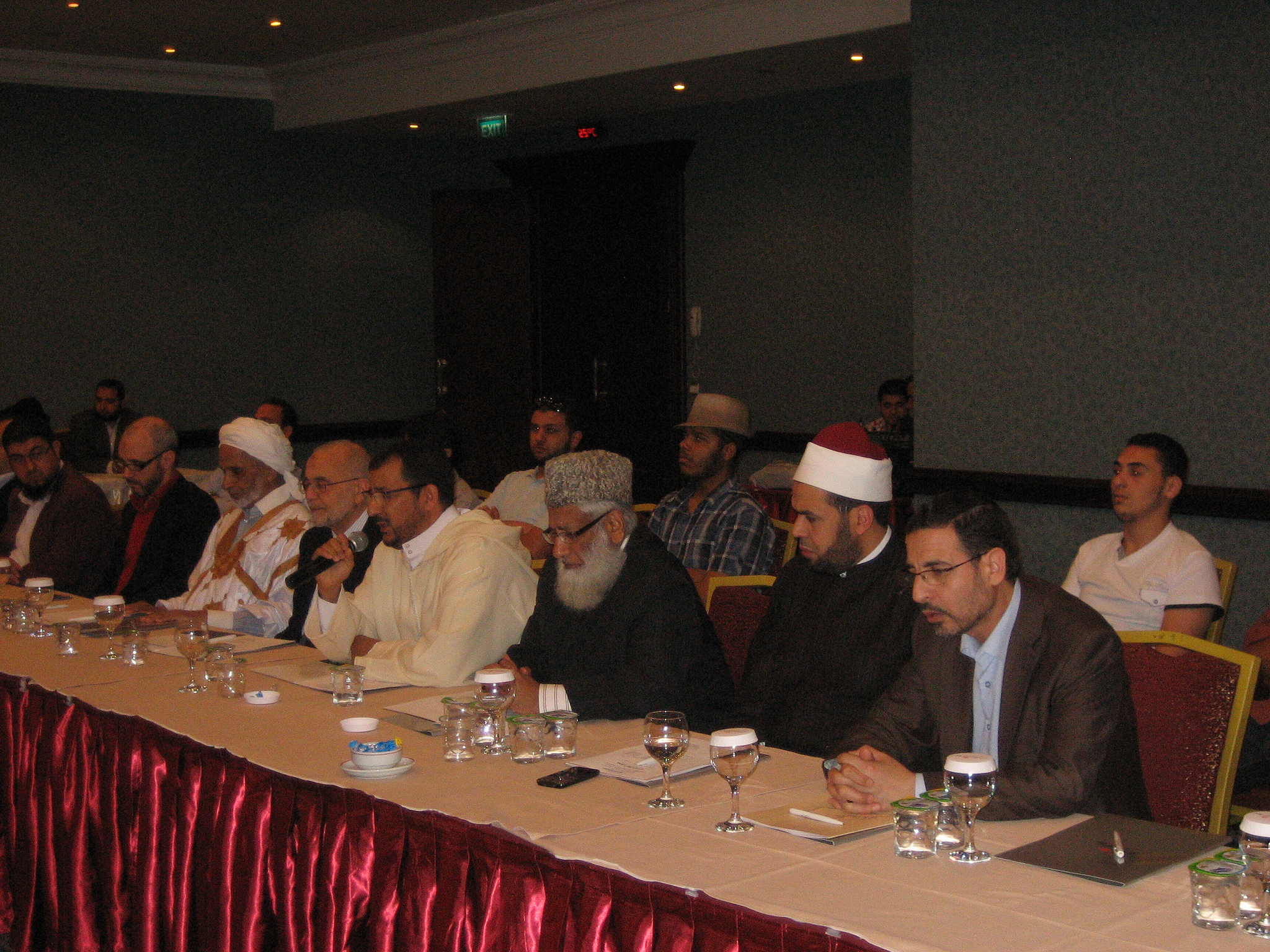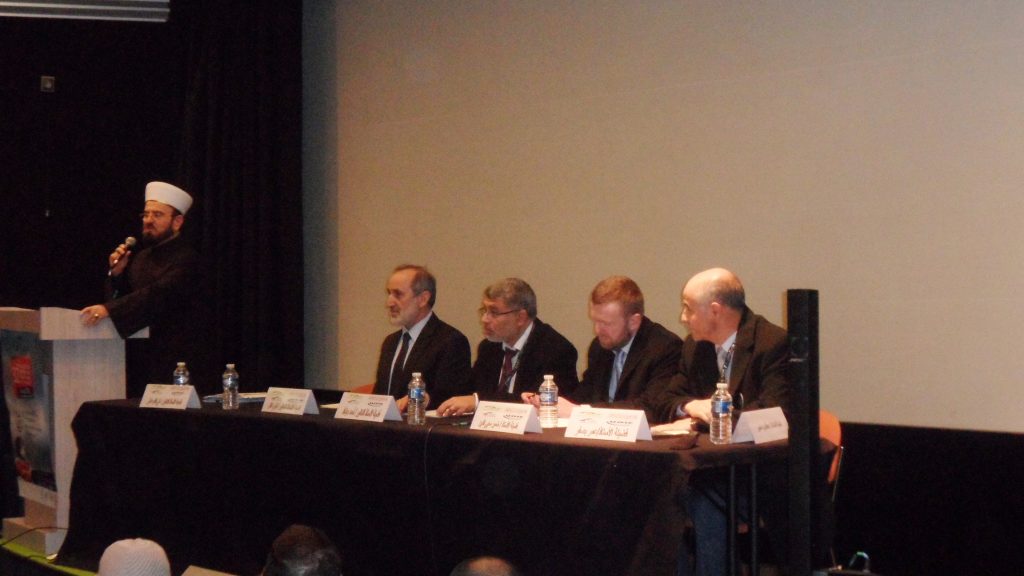The Final Statement The 21st Ordinary Session of The European Council for Fatwa and Research

The European Council for Fatwa and Research
The Final Statement
The 21st Ordinary Session of
The European Council for Fatwa and Research
Held in Dublin,
Ireland
During the period
27th of Rajab -1st of Sha’ban 1432 AH
28th of June – 1st of July, 2111
In the Name of Allah, Most Gracious, Most Merciful
The final Statement of the Twentieth Ordinary Session of the European Council for Fatwa and Research was held in Dublin, Ireland during the period 27th of Rajab – 1st of Sha’ban, 1431 AH corresponding to 28th of June – 1st of July, 2011.
Praise be to Allah, the Worlds’ Sustainer, and peace be upon our leader Muhammad and on all his family and his Companions and those who follow his guidance until the Day of Judgment.
By Allah’s Grace and His Assistance the 21st Ordinary Session of the European Council for Fatwa and Research was held in Dublin, Ireland during the period 27th of Rajab – 1st of Sha’ban, 1431 AH corresponding to 28th of June – 1st of July, 2111. This Session was inaugurated by a speech delivered by His Eminence Sheikh Hussein Halawa, the Secretary General of the ECFR, in which he welcomed the members of the ECFR and the attendees; guests and observers. He also prayed to Allah to grant full recovery and perfect health to His Eminence Sheikh Dr. Yusuf Al-Qaradawi, the Chairman of the ECFR, who, due to health issues, was unable to attend and chair this Session. In addition, Sheikh Halawa prayed to Allah for overwhelming His Eminence Sheikh Judge Faysal Maulawi, Vice Chairman and one of the main founders of the ECFR, with His mercy and forgiveness. Sheikh Halawa conveyed apologies sent by absent members, who could not make it and expressed thanks to the members, who travelled to Ireland, gave their time and exerted efforts for the sake of Allah to give Muslims residing in Europe advice pertinent to their worldly affairs as well as their affairs in the hereafter.
This was consecutively followed by a talk given by His Eminence Professor Dr. Abdul-Majeed An-Najjar, the Assistant Secretary General, in which he welcomed the attendees stating that the topic of this Session is Muslims’ attitude towards people of other faiths and dogmas highlighting the paramount importance of this topic and the Muslims’ need for more researches, studies and dialogues about it. This was successively followed by a talk given on behalf of His Eminence Sheikh Dr. Yusuf Al-Qaradawi by His Eminence Sheikh Dr. Ali Al-Quradaghi, a member of the ECFR, in which he conveyed to the members Dr. Al-Qaradawi’s greetings. He also, on behalf of the ECFR, expressed gratitude and appreciation to Ireland; the state and its people and institutions, for facilitating the holding of this Session and the services they provide to the Muslim minority in Ireland. He also expressed thanks to the United Arab Emirates in general and in particular to the Al-Maktoom Foundation for sponsoring the ICCI and the ECFR. He also gave thanks to the secretariat of the ECFR and its administration and to all its workers and particularly Sheikh Hussein Halawa, the Secretary General. He highlighted the current circumstances of the Muslim nation and the role of the European Council for Fatwa and Research and the International Union of the Muslim Scholars in terms of their support to the current peaceful revolutions and their role in European societies as scholars and Muslim minorities in terms of fair treatment with non-Muslims and encouraging them to have fair treatment with Muslims in full conformity with our religion. His Eminence Sheikh Ali Al-Quradaghi communicated the following messages:
The first message, directed to the ECFR, was to multiply its blessed efforts to add more to its great achievements through which it has become a religious authority for Muslims residing in Europe.
The second message, directed to the Muslim minorities in Europe and elsewhere, was to institutionalize their work and to have a plan for scientific and technological development.
The third message, directed to European states and peoples, was a confirmation that since it is a religion of dialogue, if Islam is left alone, it will be a religion of good and mercy to all creatures. A fact stressed by uncountable Islamic scriptural texts. The Qur’an, in essence, is a book of dialogue on the basis of which coexistence between Muslims and non-Muslims is founded.
The fourth message, directed to all scholars and particularly the scholars of the International Union of the Muslim Scholars and the scholars of the European Council for Fatwa and Research, was to be the heart of Muslim nation and to support the truth and the oppressed and not to side with the oppressors.
The opening meeting was concluded by a prayer led by Sheikh Suhaib Hasan for Al-Qaradawi’s complete recovery.
Then the ECFR resumed the agenda of the 21st Session commencing with the main topic of this session i.e. Muslims’ Attitude towards People of Other Faiths and Dogmas evolving around the following foci:
First: Islam and religions and dogmas in Europe: The following papers were submitted:
- Religions and dogmas in Europe by Prof. Dr. Suhaib Hasan
- The principal Islamic attitude towards religions and dogmas by Prof. Dr. Ali Al-Quradaghi
Second: The commonalities between Islam and other religions in Europe. The following papers were submitted:
- Common heritage and common values by Dr. Mustafa Seritch
- Towards understanding between Islam and Christianity in Europe by Prof. Dr. Abdul-Majeed An-Najjar
Third: The foundation and application of dialogue with the West. The following papers were submitted:
- Dialogue with the West by Sheikh Hussein Halawa
- The religious dialogue by Prof. Dr. Ahmad Jaballah
- Internal dialogue by Dr. Ahmad Ar-Rawi
Fourth: Social and human relations with non-Muslims. The following papers were submitted:
- Mutual visits and social relations between Muslims and non-Muslims by Prof. Dr. Hamza Ash-Sharif
- Will and testament for non-Muslim parents and relatives, rules, conditions and Islamic objectives by Prof. Dr. Salah Sultan
- Apostasy in light of freedom of belief by Prof. Dr. Jamal Badawi
Fifth: adjourned issues concerning Halal slaughtering and food additives. The following papers were submitted:
- Food Additives and medicines by Dr. Muhammad Al-Hauwari
- Halal slaughtering in Europe by Fath-Allah ‘Uthmani and Khalid Abu Shamah
Six: Fatawa issued by the ECFR:
A number of questions were raised to the ECFR. The ECFR deliberated on some of them and answers were given by certain members.
The ECFR also deliberated on the European attitude towards Arab revolutions and their impact on Muslims in the West. The ECFR held an administrative meeting, attended only by members, during which the following was discussed:
- The ECFR deliberated on the reports submitted by Fatwa committees affiliated to the ECFR located in the UK, France and Germany and the reports submitted by the research committee. The ECFR also deliberated on the financial situation of the ECFR. The ECFR decided to prepare Fatawa issued by the ECFR in a complete form and endeavour to translate them into several European languages.
- The ECFR deliberated on amending items of its statutory foundation and the internal regulations on the basis of the proposal submitted by the secretariat of the ECFR as a result of the vacancy of the position of vice chairman. According to this proposal two vice chairmen, and not one chairman, would be elected one of whom would be resident in Europe. This amendment was unanimously accepted.
- By Allah’s grace election for two chairmen was conducted in a friendly and transparent atmosphere resulting in the appointment of the non-European resident Sheikh Dr. Ali Al-Quradaghi and the European resident Sheikh Dr. Abdullah Al-Judai’ as vice chairmen.
On the basis of the presentations and having deliberated upon the above-mentioned papers, the ECFR reached the following conclusions:
Firstly resolutions
Resolution 1/21
The Concept of apostasy and its rules
The ECFR decided to adjourn this topic to prepare more researches and review previously issued papers, studies and resolutions pertinent to this matter in order to reach a clear vision.
Resolution 2/21
Foods and Medications
Since the issue of foods and medications is in need of more detailed studies in light of Islamic principals, the ECFR decided the following:
- To adjourn this matter to prepare more papers in order to issue an inclusive document of the conditions of the Halal and Haram (permissible and impermissible) foods and medications.
- To form a committee in charge of supervising Halal slaughtering as it is vitally important to deliberate on this issue in the coming session and to cooperate with Muslim and non-Muslim experts in order to reach Islamic criteria that facilitate Halal foods for Muslims.
Secondly recommendations:
Upon deliberating on the above-mentioned papers the ECFR issued the following recommendations:
- The entire world and particularly Europe are inhabited by people of various faiths. The Western constitution guarantees freedom of religion and religious practices respecting the distinctiveness of each religious community. Since Islam is the second religion in the West and Muslims, who are legal residents there, contribute to the progress and development of western societies, the ECFR appeals to western states to protect the rights of Muslims and other minorities and to prevent any violations of their rights.
- The ECFR stresses the principal of civilized dialogue among all the components of human society at all levels, shunning all types of violence and clashes and establishing relations on the basis of common values giving opportunities for constructive cooperation, which serves the interest of all human beings. The ECFR appeals to Muslims and particularly Muslims residing in Europe to strengthen this positive communication and encourage cooperation and trust with all others.
- The ECFR recommends Muslims in Europe to abide by the moderate Islamic approach when addressing and holding dialogue with others on the basis of mutual respect, human coexistence and fruitful cooperation that protects societies against all types of mischief and what threatens their future deeming that a humane social activity encouraged by Islam and Muslims’ values.
- The ECFR appeals to Muslims to set up Islamic organizations and authorities specialized in training and preparing for guided dialogues with non-Muslims to take urgent steps in this regard. The ECFR issued this recommendation since such organizations are vitally important for well-balanced dialogues and are able to turn them into a way of life for which all people cooperate overcoming all types of disputes that destroy familiarity and respect among members of one and the same society.
- The ECFR recommends Muslims to hold fast to the Islamic values of kindness, mercy, justice and positive communications with all others and particularly relatives, neighbours and friends; Muslims and non-Muslims. By virtue of the Islamic values Muslims should abide thereby and by all the requirements of authentic positive integration to the societies where they reside, while preserving their Muslim identity. In this context the ECFR holds the opinion that it is permissible for Muslims to make wills testaments for non-Muslim relatives. Muslims should consider this positively since it achieves the above-confirmed kindness and good relations.
- The ECFR recommends accredited Islamic organizations in the West to play a role in the accurate supervision of the companies issuing Halal certificates and providing authentic information about reliable organizations, involved in this business, to Muslim consumers. The ECFR also recommends these organizations to put pressure on Halal companies to abide by Islamic criteria.
- The ECFR recommends Muslims to set up Islamic economic organizations specialized in slaughtering and Halal food products to facilitate them at suitable cost, while fulfilling quality specifications and international hygienic criteria.
- The ECFR recommends European states to respect the Muslim identity in terms of their foods and to facilitate Halal foods and drinks for Muslims as citizens.
Thirdly Fatawa:
Fatwa 1/21
Illegality of Profaning Gospels
Question: Is it permissible for Muslims to burn Gospels as non-Muslims burnt Qur’an? This is the equal treatment stated in the Qur’an. Allah said: “If then any one transgresses the prohibition against you, Transgress ye likewise against him. But fear Allah, and know that Allah is with those who restrain themselves.” (Trans. 02:194)
Answer: Since Muslims believe in the original messages revealed to Moses and Jesus, any act of profanity, by burning or otherwise, be it an action or a reaction, against the Old or the New Testament is forbidden. It has been authentically narrated that the Prophet Muhammad, peace be upon him, showed respect to the Old Testament the Jews in his time had. Moreover, such an act, which is divisive and causes mischief and disintegration, is not in harmony with the Islamic obligations in terms of being on good terms with the people of the Book. If some people transgressed on the Qur’an or Islam, Muslims should seek legal channels to prevent it. Allah commanded the Prophet Muhammad, peace be upon him, stating: “So patiently persevere: for verily the promise of Allah is true: nor let those shake thy firmness, who have (themselves) no certainty of faith.” (Trans. 30:60)
Fatwa 2/21
Financial Support for Non-profitable Institutions by Zakah
Question: What is the Islamic rule regarding providing an educational institution with financial support, raised by Zakah, spent on the following:
Excellent male and female students unable to pay the study fees.
Wages for teaching and administrative staff members.
Equipping classes and laboratories to a suitable standard.
Preparing a library that satisfies the needs of studies and researches.
Needless to say that the cost of these matters is beyond the capacity of these institutions in the West, which are mainly dependent on study fees that can only cover part of the school expenses. This situation gives no other option but seeking financial and material donations from Muslim minorities. Is it Islamically permissible to spend funds raised by means of Zakah on the above-mentioned matters?
Answer: It is permissible to spend some funds raised by means of Zakah on scholarships granted to students who cannot afford study fees as they are directly included in the category of the poor. As for all the other above-mentioned expenses, they should be covered by general donations only.
Fatwa 3/21
Legality of Establishing Friday Prayers More than Once in One Mosque Because of Certain Reasons
Question: Some mosques are too small to accommodate the great numbers of Muslims offering Friday prayers, so they have no option but to pray in roads surrounding mosques. This matter disturbs the traffic and the shops owners. Some of them filed a complaint to the authorities. Hence, some authorities banned prayers in streets. The matter became more serious as Muslims were threatened by closing mosques. In light of this is it permissible for the committee supervising mosques to establish Friday prayers twice in one mosque? If this is permissible, are payers valid if led by the same Imam or should they be led by an Imam who has not offered his Friday’s prayer?
Answer: In the past the issue of establishing Friday prayers in many mosques located in one and the same city was deliberated on by Muslim jurists. As a result of the expansion of cities the number of mosques increased and consequently Friday prayers were established in more than a place. Muslim jurists, on the basis of their Ijtihad, expressed a wide range of opinions regarding Friday prayers. Some stated that Friday prayers could be established only in one mosque, others stressed that Friday prayers could only be offered in the most ancient mosque. This disagreement continued until Imam Al-Sabki issued his Fatwa entitled holding fast to the one Deity by establishing two Friday’s prayers in one city. This disagreement was due to the absence of a positive or a negative scriptural text. Muslim jurists were inclined to classify establishing more than a Friday’s prayer in one city as forbidden to protect Muslims against divisions and rifts.
Nowadays, due to Muslims’ need, there are many mosques, where Friday prayers are established in one city. The early Muslim jurists’ concern is no longer visible. The above-mentioned question raises similar situation since sometimes mosques are too small to accommodate Muslims and other times, due to their job circumstances in Europe, it is very difficult for Muslims to gather at the same time. Moreover, there are few mosques in a number of cities. Hence, the ECFR perceives no harm in establishing more than a Friday’s prayer in one mosque provided there is a reason such as the difficulty of gathering at the same time or the fact that a mosque is too small to accommodate Muslims. Preventing this causes remissness as it deprives a large number of Muslims of observing Friday prayers, deemed to be a great Islamic ritual, which achieves Maslahah Hajjiyah[1] e.g. facilitating Muslims’ gathering, familiarity among Muslims and an opportunity for Muslim-Muslim recognition. In addition, Friday prayers are preceded by a ceremony, considered an opportunity for admonition and education. Nevertheless, the ECFR stresses that repeating Friday prayers in one mosque should be supervised by the administration of mosque or Islamic centre, which is entitled to take the due procedures such as determining time and choosing an Imam. However, it is better that each Friday prayer is led by a different Imam unless it is not available. Mu’ath Ibn Jabal used to pray ‘Isha with the Prophet and then he would go to Qiba’ mosque to lead ‘Isha prayer.
Fatwa 4/21
Selling programming services to companies, whose activities or some of its activities are Islamically impermissible
Question: A specialist in electronic media works in a company, specialized in programming, which sells programming services to other companies, whose activities might be impermissible or there could be doubts about its permissibility according to Islam e.g. banks, insurance companies and lotteries. But the company where he works also sells services to other companies, whose activities are permissible according to Islam. These companies are very few. This specialist could be asked to provide programming services to any companies contracted with the company where he works. He has no right to refuse any order. What is the Islamic rule if he receives orders to provide a service to a company whose activities are not permissible according to Islam bearing in mind that this is the case of most of the companies involved in electronic media?
Answer: Principally electronic media programming is permissible in Islam as long as it does not involve committing a sin. Consequently this job in this programming company is permissible according to Islam regardless of the fact that this company sells programming services to companies that some of its activities might be Islamically forbidden. Nevertheless, if the company instructs its employee to provide programming services to a company whose activities are Islamically forbidden, he should do his best to avoid it.
The ECFR’s Attitude towards Arab Revolutions
On the basis of the states’ duties in representing their peoples in working sincerely to protect their interests and not wasting their resources, the ECFR deliberated on the peaceful Arab revolutions demanding stopping oppression, freedom and reformation in many fields and issued the following resolutions:
Firstly the ECFR regrets deeply the oppression faced by Muslim brothers and sisters as their states are using their armies and security forces and natural resources to suppress the peaceful rebels demanding their freedom and condemning corruption. The ECFR perceives the daily shed blood, destroying properties and committing violations as a stigma resulting in the fact that these states have lost their credibility and legitimacy in the sight of their peoples and the entire world.
Secondly the ECFR appreciates the efforts exerted by the youth, who participated in the revolutions showing a great level of civilized behaviour and morality. They astonished the world by their discipline, responsible approach and abiding by peaceful expression of their demands, which reflected their love for their homes and their eagerness to achieve every good for them. They should keep their revolutions peaceful and unite their visions and demands so that they can achieve the object for which they commenced their revolutions. They also should beware of the plots aiming at causing rifts and divisions among them or stealing the outcome of their efforts.
Thirdly the ECFR appeals to the Muslim leaders of the countries, where the people have not demonstrated, to hasten to achieve real reformation and exert effort to encourage cohesiveness between them and their peoples to protect their natural resources as a fulfillment of the responsibility they have accepted towards their countries otherwise they will lose their positions and their peoples will suffer loss as well. The ECFR believes that reformation is still possible provided it is founded on sincere intentions and strong determination and will.
Fourthly the events occurring in the Arab world have serious repercussions on Muslims living in the West, as due to the fact that Muslims living in these Arab countries are too busy to assist Muslims living in the West, the support they provide has been delayed or largely decreased. On this basis, the ECFR appeals to the well-off Muslims to support their Muslim brethren residing in the West in every way that strengthens their existence, improves their affairs and assists them in continuing their mission in their western societies which they have become part of. The ECFR also appeals to those who sincerely work in these countries to help their brethren to achieve the rightly guided positive integration, which enables Muslims to preserve the firmly rooted Islamic values and cooperate with others achieving progress to the countries where they live.
Fifth: The ECFR appreciates the role performed by European peoples and states that supported Arab peoples in their legal demands. The ECFR stresses the importance of supporting human values that confirm these peoples’ right of self-determination.
The ECFR concluded the 21st session confirming the usual recommendations. The Council also recommends that Muslims in general and those dwelling in the West in particular adhere to Allah’s religion, brotherhood, tolerance, moderation and cooperation in matters of benevolence and righteousness, and adopt quiet dialogue and sound methods to solve controversial problems away from the programmes of strictness and paths of extremism that would distort the image of Islam and badly harm Muslims in general and Muslim minorities in particular. The enemies of Islam and those ignorant of it would defame it and warn others of it and its followers and instigate other nations against it. Allah Almighty says: “Invite (all) to the Way of your Lord with wisdom and beautiful preaching and argue with them in ways that are best and most gracious.” (An-Nahl 125)
The ECFR concluded the proceedings of the21th Session declaring that the 22nd session will be held at the end of June 2012.
Our last prayer is praise be to Allah and may Allah’s peace, blessing and mercy be upon Prophet Muhammad, his family and his Companions.
[1] It refers to Muslims’ worldly interests that if not satisfied Muslims face hardship.





